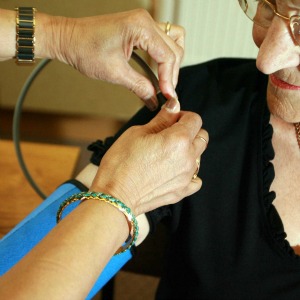Managing patients with diabetes at ‘intermediate care clinics’ instead of in primary care led to more patients gaining control of their condition, say researchers who analysed the impact of the intermediate clinics at three PCTs in the Midlands.
The team reported in the journal PLoS ONE that intermediate care clinics led to around 50% more patients achieving all three NICE-recommended targets for blood pressure, cholesterol and glucose control compared with primary care.
However, the authors conceded the increase in the proportion of patients achieving control targets failed to reach statistical significance, despite intermediate care being associated with increased costs for the NHS.
Intermediate care clinics for diabetes (ICCD) were first introduced in the NHS in 2004, with the aim of improving the provision of care and outcomes for patients with diabetes through use of multidisciplinary teams linked to general practice, with the added potential to develop expertise in the community and reduce costs.
To look at their impact, a team led by Dr Andrew Wilson at the University of Leicester examined the clinical and cost-effectiveness of community-based ICCDs operating in the East and West Midlands, over the period 2009 to 2011. The study included 1,280 patients from 49 general practices, with 1,057 patients from 24 of the practices randomly assigned to treatment in the intermediate care clinics and 940 patients from the remaining 25 practices assigned to continued management in primary care.
After 18 months, 14.3% of patients from the intermediate care clinics achieved all three NICE targets (blood pressure <140/80 mmHg; cholesterol <154 mg/dl [4 mmol/l]; and HbA1c ≤7.0%/53 mmol/mol), compared with just 9.3% of the control group.
However, after adjusting for confounders the difference between the groups fell short of statistical significance.
Both primary care and community clinic costs were significantly higher for ICCDs compared with primary care management of diabetes, but there were no differences in hospital costs or overall healthcare costs. The researchers estimated that the ICCDs cost £7,778 per quality-adjusted life-year gained, indicating ‘ICCD was marginally more expensive at producing health gain’.
Despite these uncertainties, the researchers said commissioners should consider using ICCDs.
They concluded: ‘Our findings support the consideration of ICCD in the range of services commissioned to provide care for people with diabetes. This is especially relevant in the UK with the current change in NHS commissioning, with an emphasis on “personalised, integrated community-based care”.’
PLoS ONE 2014; available online 15 April
Pulse October survey
Take our July 2025 survey to potentially win £1.000 worth of tokens













